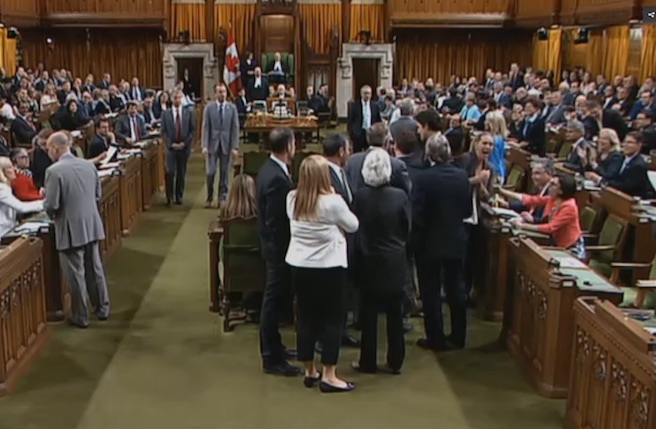Like this article? rabble is reader-supported journalism. Chip in to keep stories like these coming.
On January 4, 1642, the English King, Charles I, entered the House of Commons, accompanied by armed guards.
The King intended to arrest five MPs whom he claimed had committed high treason.
It did not go well for Charles I.
The five MPs escaped by boat before the King and his entourage got to the House. The King then tried to take over the place with muscle; he pushed the Speaker out of his throne, and sat there himself for a while.
But nobody was impressed.
In the end, Charles had to leave with his tail between his legs. Worse, his actions precipitated the First English Civil War.
That war, in turn, led to the Second Civil War, in 1648. After the Parliamentary side defeated Charles’ Royalists, the House of Commons tried Charles for high treason, found him guilty and, ultimately, had him beheaded.
No British monarch has entered the House of Commons since.
That is why what the British call the Queen’s Speech happens in their upper house, the House of Lords, and the Canadian version, the Speech from the Throne, in our Parliament’s red (the royal colour) chamber, the Senate.
A prime minister is merely another MP in the House
It has never been necessary to impose similar restrictions, in Britain’s or in Canada’s parliamentary system, on the person who is, in effect, the chief executive of the government, the prime minister.
A Canadian (or British, or Indian, or Australian) prime minister is merely another member of Parliament. In the House of Commons, the Speaker, heeding the will of the House as a whole, is in charge, not the Prime Minister.
Our system has often frustrated prime ministers who have seen themselves as hard-driven, get-things-done, chief executives, and who believe they have the direct mandate of the people. Charles I, too, believed he had a direct mandate. He called it a divine mandate.
The current prime minister’s father, Pierre Trudeau, considered Parliament to be a tiresome talking shop, where MPs prattled pointlessly merely to hear themselves speak.
Trudeau-père famously said that 50 yards from Parliament Hill, MPs were “nobodies.”
The elder Trudeau initiated the process of centralizing power in the Prime Minister’s Office and its civil service arm, the Privy Council Office. He began the transformation of the Canadian parliamentary system into one more closely resembling the American presidential system.
Pierre Trudeau’s successors, most notably Stephen Harper, extended this transformation.
Harper’s Conservative government gave short shrift to the House of Commons. It used closure, or time limitation, on debates a record number of times.
We’re just trying to get things done, Conservatives would argue, and the opposition is always obstructing and bringing the work of government to a standstill.
Justin Trudeau promised, during the last election campaign, that he would reverse this trend. Respect for Parliament was a key part of the Liberals’ democratic reform plan. They called it: “Fair and Open Government.”
Trudeau used to say that it would be poetic justice for him to reverse the trend to centralize power that his father had started.
Respect for Parliament was a key Liberal pledge
The English historian, politician and writer, John Dalberg-Acton — Lord Acton — famously wrote the oft-quoted aphorism that begins: “Power tends to corrupt …”
But even Dalberg-Acton might be surprised by how quickly that has happened in the case of the new Liberal government.
When the Conservatives were in power, the Liberals vigorously condemned their constant use of time allocation. Now, the Liberals seem to be doing the same.
In the run-up to the election campaign, Justin Trudeau promised that an all-party committee would formulate an electoral reform proposal.
When, at the eleventh hour, he finally got around to setting up that committee, Trudeau gave his own party a majority of the members.
And then, on Wednesday, when New Democratic Party MPs seemed to be deliberately blocking the passage of the Conservative Whip to his seat — and thereby delaying yet another time allocation vote — Trudeau actually left his own seat, marched across the House, and physically intervened.
As so many others have commented: What was he thinking?
The point of parliamentary democracy is that we resolve our differences and take decisions peacefully, according to rules, and with respect for order.
Professional hockey might tolerate fighting, as a pressure valve. The hockey establishment, at least tacitly, accepts the odd notion that, at times, teams need to use paid enforcers to send a message to other teams when they rough up the goalie or try to injure a star player.
Fighting, or even any sort of physical contact, is not part of the game in the House of Commons.
There should be no need for enforcers in Parliament.
In his supposedly unqualified apology, Justin Trudeau tried to argue that his actions on Wednesday were somehow mitigated by the fact that he was trying to assist the Official Opposition Whip to his seat.
Since when is that the Prime Minister’s job? Does the Prime Minister think he is an usher, or, perhaps, the House’s bouncer?
Newfoundland Liberal MP Rodger Cuzner gave the lie to that pretention of an honourable motive when, in trying to justify the Prime Minister’ s physical intervention, he said: “He wants to get stuff done and the opposition parties have been absolutely non-co-operative.”
Trying to “get stuff done” in the face of “non-co-operative” opposition parties. Sound like a familiar argument?
Parliamentary democracy can be inconvenient, indeed. Stephen Harper used to think so. He lost the election; but did he lose the argument?
Like this article? rabble is reader-supported journalism. Chip in to keep stories like these coming.




